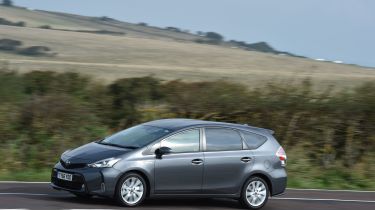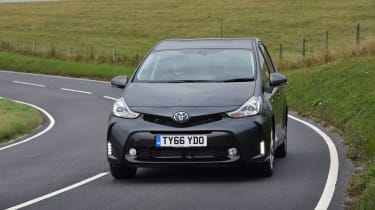Toyota Prius+ (2012-2020) review
If you want a seven-seater hybrid MPV, the Toyota Prius+ is one of your few option, but it's now only available secondhand

Pros
- Only seven-seat hybrid MPV
- Spacious and practical
- Low company-car tax
Cons
- Not very economical
- Tiny electric range
- Noisy engine
| Car type | Fuel economy | CO2 emissions | 0-62mph |
|---|---|---|---|
| Hybrid | 49mpg | 132-135g/km | 11.3s |
The Toyota Prius+, as its name suggests, is a bigger version of the strong-selling hatchback Toyota Prius. Just like that car, it's driven by an electric motor paired to a petrol engine and promises better fuel economy and emissions than a purely petrol-engined equivalent. It can carry a driver plus up to six passengers in comfort.
So far, so good, then – but there's a catch. The Prius+ is based on the now-discontinued third-generation model, not the current fourth-generation model you can buy in hatchback from. The Prius+ itself was discontinued in autumn 2020, so you can now only buy one used.
At the time of its arrival, the Prius+ was the only hybrid seven-seat MPV you could buy, and that fact never changed. There are other electric and hybrid seven-seaters, but they’re SUVs: the likes of the Volvo XC90 Recharge, Tesla Model X and Mercedes EQV are much more expensive than the Toyota.
You can get hybrid versions of cars that are otherwise available as seven-seaters, such as the Mitsubishi Outlander, but they only come with five seats due to space given over to their hybrid systems. The same is true of the BMW 225xe, while the electric Nissan e-NV200 Combi, although a seven-seater, is a bit too van-like for most tastes.
On the face of it, the Prius+'s claimed fuel economy of just under 50mpg isn’t that impressive – especially when the latest Prius hatchback returns more – but fairly low CO2 emissions of 132-135g/km ensure it still appeals to company-car drivers, even if plug-in hybrids are the real BiK tax busters these days.
While there are certainly some financial benefits to the Prius+, don’t expect to get the same smile on your face after driving one. This car prefers to be driven slowly and smoothly. If you floor the throttle, the whine from the CVT gearbox gets loud, although there were improvements made over to years to reduce the noise.
At low speeds, the Prius+ is nearly silent, and it can travel around 1.3 miles on its electric motor at speeds below 31mph. Above those speeds, it’s generally quiet as long as you drive gently. The car’s slippery shape keeps wind noise low. It’s spacious, too, with seven thin-backed seats arranged over three rows, and the airy feeling is emphasised by a large panoramic roof fitted to all models.
Just two trim levels were available for the Prius+, but the good news is that both Icon and Excel are well equipped. So well, in fact, that unless you want sat nav, leather upholstery or self-parking, you’ll be perfectly happy with the Icon, which is also cheaper to run thanks to its smaller wheels.
Since early 2018, the Prius+ came with Toyota’s Safety Sense system fitted as standard. This is a collection of various safety features and driving aids that helps reduce the chance of a collision. Like most seven-seaters, the Prius+ has plenty of boot space when the third row of seats is folded, but with them in place, you’ve only got as much as you would get in a supermini.
Things are much better when it comes to reliability: Toyota finished sixth overall in the 2020 edition of the Driver Power owner satisfaction survey and a five-year/100,000-mile warranty provides reassurance.
The attraction of the Toyota Prius+ is pretty easy to see: it’s in a class of its own if you want an affordable seven-seat hybrid. We won’t pretend for a second that there isn’t room for improvement, but its almost unique combination of qualities means it'll be the only possible choice for many people. For a more detailed look at the Toyota Prius+, read on for the rest of our in-depth review...



